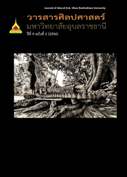แนวคิดและทฤษฎีในการศึกษาการจัดรูปแบบใหม่ ของเครือข่ายข้าวลูกผสม
Main Article Content
บทคัดย่อ
บทความนี้ได้เสนอแนวคิด และทฤษฎีในการวิเคราะห์การจัดรูปแบบใหม่ (reconfigure).ของกระบวนการผลิตข้าวในประเทศไทย ภายใต้เทคโนโลยีชีวภาพด้านการเกษตร โดยการศึกษาการนำข้าวลูกผสมเข้าสู่วงจรการผลิตโดยบริษัทในเครือเจริญโภคภัณฑ์ (CP) ประการแรกบทความนี้ ได้นำเสนอแนวคิด การเมืองชีวญาณ เพื่อแสดงให้เห็นถึงความร่วมมือระหว่างสถาบันวิจัยภาครัฐและภาคเอกชน เป็นการอำนวยความสะดวกในนำข้าวลูกผสมออกสู่ตลาดนอกจากนี้ยังได้อธิบายถึงวิธีการที่บริษัทเมล็ดพันธุ์นำเสนอข้าวลูกผสมให้แก่เกษตรกร และผลกระทบของเทคโนโลยีข้าวลูกผสมต่อปฏิบัติการ และวิถีชีวิตของเกษตรกร ประการที่สองผู้เขียนได้ใช้ทฤษฎีเครือข่ายผู้กระทำการ (actornetwork...theory)..เพื่อแสดงให้เห็นกระบวนการของต่อรองเพื่อรักษาผลประโยชน์ของผู้กระทำการ ที่เป็นมนุษย์และไม่ใช่มนุษย์ ในเครือข่ายที่มีความแตกต่างหลากหลาย แนวคิดของ 'การปฏิบัติการทางไกล' ได้อธิบายบทบาทที่สำคัญอย่างยิ่งของบริษัทซีพี ในการควบคุมการปฏิบัติการของเกษตรกรที่อยู่ในพื้นที่ห่างไกล โดยบริษัทเมล็ดพันธุ์มีจุดมุ่งหมายที่จะควบคุมกระบวนการผลิตข้าว ตั้งแต่การปลูกต้นกล้าจนถึงการเก็บเกี่ยวสู่โรงสี ทั้งนี้ดูเหมือนว่าการปฏิบัติของเกษตรกร จะถูกควบคุม ภายใต้อำนาจและความรู้ของบริษัทเมล็ดพันธุ์ และพวกเขาไม่ได้ครอบครองปัจจัยการผลิตอีกต่อไป ประการสุดท้าย บทความนี้ได้เสนอแนวคิด “double movement” เพื่ออธิบายถึงการเคลื่อนไหวทางสังคมของกลุ่มเกษตรกรที่จะต่อรองกับนวัตกรรมเทคโนโลยีชีวภาพ และมีวิธีการรับมือกับเทคโนโลยีข้าวลูกผสม ที่มีความซับซ้อนอย่างไร
Theory and concept in the study of reconfiguration of hybrid rice network
This paper aims to propose theories and concepts for analyzing the reconfiguration of rice production system in Thailand under the emergence of agricultural biotechnology. It is illustrated by a case study of the introduction of hybrid rice by Charoen Pokphand Group (CP), a powerful conglomerate company. First, this paper demonstrates how the concept of ‘governmentality’ explains the cooperation of public and private research institutes facilitated the conditions in distribution of hybrid rice into the market. Moreover, the paper explains how hybrid rice has been introduced to farmers, how it effects farmers’ practice and their livelihoods. Secondly, through the application of actor network theory, it shows the process of negotiation that balances the benefits amongst human and non-human actors in this heterogeneous network. The concept of ‘action at a distance’ describes the central role of CP to regulate farmer’s practices in the periphery. The seed company aims to control rice production from seedling to the miller. It seems that farmers’ practices are controlled under power and knowledge of this company; and they are dispossessed from their means of production. Finally, the author applies the concept of “double movement’ to explain social movements of farmers, how they negotiate and contest with the sophisticated hybrid rice technology.


